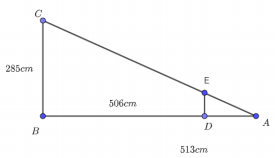Questões de Concurso
Comentadas para professor - inglês
Foram encontradas 12.435 questões
Resolva questões gratuitamente!
Junte-se a mais de 4 milhões de concurseiros!
O texto acima se refere a qual acordo?
Sobre o pantanal é correto afirmar que:
Paulo é caminhoneiro, e precisa percorrer um caminho em linha reta, que seria o caminho mais perto. Existe porém, um outro caminho, mais longo, para que precise abastecer, antes de chegar em seu destino. Considerando que Paulo esteja no ponto A, o ponto B seja a localização do posto de combustível, e o ponto C seja o destino de Paulo. Paulo sabe que ABC formam um triangulo retângulo, com ângulo reto no vértice B, e

o ângulo do vértice A é a. Paulo sabe também, que a = 12/16. Sabendo, que todas os comprimentos do
exercícios são em quilômetros, qual a distância entre
os pontos A e C?
Para responder à questão, leia atentamente o texto a seguir:
Apelo
Para não dar parte de fraco, ah, Senhora, fui beber com os amigos. Uma hora da noite eles se iam e eu ficava só, sem o perdão de sua presença a todas as aflições do dia, como a última luz na varanda.